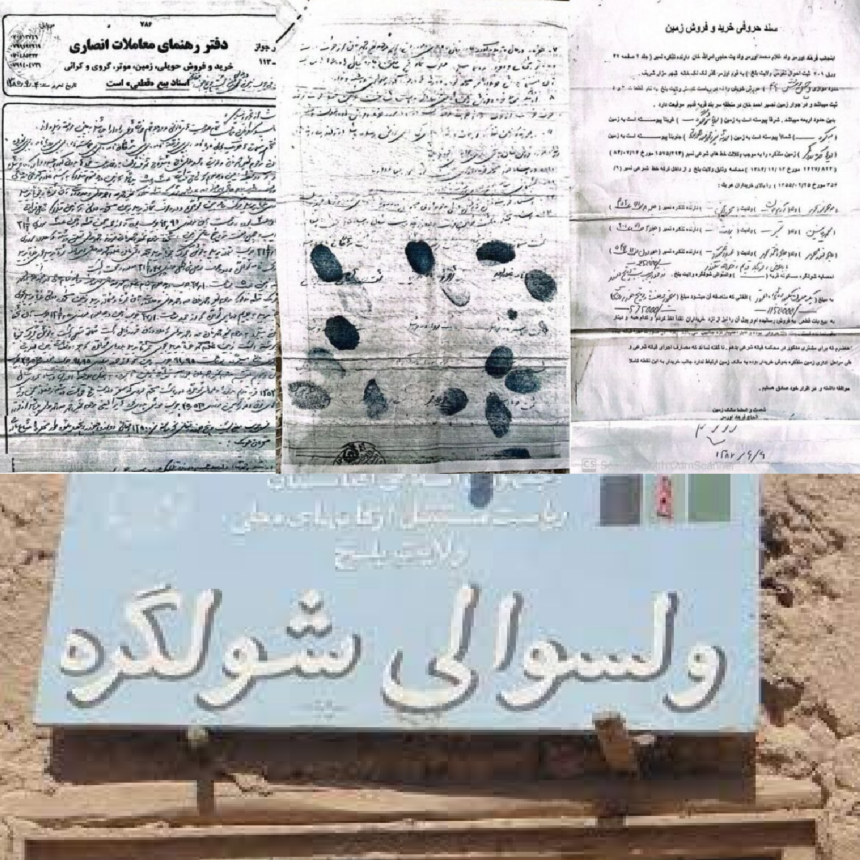RASC News Agency: Residents of Shulgara district in Balkh province have accused Taliban authorities of orchestrating a deliberate land-grab campaign, stripping them of their legally owned farmland under the fabricated claim that it is “state property” and redistributing it to the group’s loyalists and associates. Documents obtained by Etilaatroz reveal that the contested land measuring 91.5 jeribs is located in Old Shulgara village. Traditional ownership records demonstrate that the land was legally purchased in 2005 and 2008, and is currently held by 35 recognized owners.
Local sources confirm that following the Taliban’s return to power, Mawlawi Mubarez, the group’s head of agriculture in Shulgara, arbitrarily reclassified the property as government land. He then parceled it out among Taliban supporters for housing construction. Landowners filed formal complaints with the Taliban’s Department of Agriculture and the so-called Commission for the Prevention of Land Usurpation. Subsequent reviews of cadastral maps and historical deeds reaffirmed the private ownership of the land, much of which had already been sold to secondary buyers through legitimate transactions.
Despite these legal confirmations, the Taliban official reassigned the land to two daughters of a former owner, Nasir Ahmad. Residents argue this maneuver was driven not by law but by political calculation and ethnic favoritism, serving as a convenient pretext for the Taliban to distribute land to its network of loyalists. Even Taliban-controlled courts initially rejected the claim of Nasir Ahmad’s heirs and recognized the rights of the current owners. Yet, in characteristic fashion, the group ignored its own judicial rulings.
One resident told RASC News Agency that in recent weeks, “nearly 300 people have been building houses on the confiscated land, despite a formal court order prohibiting all construction.” He stressed that those engaged in construction were overwhelmingly Taliban affiliates and civil servants working under the group’s administration, while the supposed plaintiffs the daughters of Nasir Ahmad had already disappeared from the area.
In a further act of intimidation, landowners reported that their lawyer, Sayed Azim, was arrested by Taliban authorities after persistently pursuing the case and exposing it to the media. His detention, residents believe, was designed to silence resistance and discourage others from seeking justice.
This case is emblematic of a wider pattern. Over the past three years, repeated reports have documented how Taliban courts consistently deliver biased rulings in land disputes particularly those involving Kuchi nomads and Hazara communities. In most cases, judgments have overwhelmingly favored the Kuchis, forcing Hazara families into coerced displacement, heavy financial penalties, or outright loss of ancestral land.
Legal analysts warn that these practices represent not only a gross violation of property rights, but also the Taliban’s deliberate weaponization of the judiciary to entrench political dominance and ethnic favoritism. By using land seizures as tools of patronage, the Taliban undermine the very idea of impartial justice and reinforce their image as a predatory regime incapable of governing legitimately.
Beyond the legal dimensions, observers caution that such policies fuel deepening mistrust among Afghanistan’s communities and risk triggering future ethnic conflict. The systematic dispossession of farmers and families in Shulgara is not an isolated abuse it is a stark illustration of how the Taliban’s rule translates into institutionalized injustice, social fragmentation, and the erosion of any hope for rule of law. By transforming courts into instruments of theft and coercion, the Taliban have once again revealed themselves not as rulers but as occupiers feeding corruption, perpetuating grievance, and sowing division in a country already fractured by decades of war.






